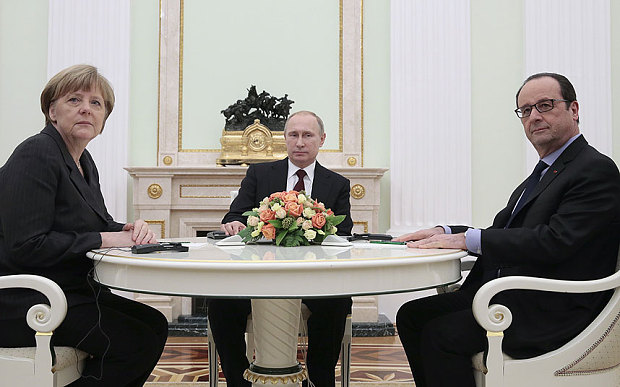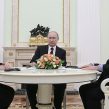
Putin-Merkel-Hollande Meeting Yields Worse Armistice Terms for Ukraine
Publication: Eurasia Daily Monitor Volume: 12 Issue: 26
By:

German Chancellor Angela Merkel and French President Francois Hollande held talks with Russian President Vladimir Putin in Moscow during the night of February 6–7. Merkel and Hollande had conferred with Ukrainian President Petro Poroshenko in Kyiv during the preceding night, eliciting his consent to a draft armistice prepared in Berlin and Paris. The meeting in Moscow coordinated that document with Putin’s proposals, aiming to sign a new armistice agreement in Minsk on February 11 (see below).
Putin made his participation in that summit conditional on a prior agreement regarding the summit’s outcome (Interfax, February 7). This conditionality implies an outcome clearly weighted in Russia’s favor, since Russia holds the military and diplomatic initiative.
Putin turned down Merkel’s suggestions regarding the withdrawal of Russian forces from what is legally Ukrainian territory and a stop to the cross-border flow of Russian arms and soldiers (Frankfurter Allgemeine, February 7, 8). Merkel did not seem to insist, however. Germany is anxious for another ceasefire to be signed on February 11 in Minsk, even at some cost to Ukrainian interests. The French government shares that view, but only the German position matters in this case. Ukraine, unassisted by the West, is being held at bay militarily. Russia is strongly placed to wait and exploit its advantage in the field, until assured of a summit outcome in its favor.
Unsurprisingly, Putin’s inputs have resulted in even worse terms for Ukraine, compared with the Merkel-Hollande draft. German and French officials had hinted at some elements of their draft, including: an immediate ceasefire as absolute priority; Putin to “use his influence on the separatists” to stop their offensive and bring them back to negotiations with Kyiv; a new demarcation line, “Minsk Plus,” to incorporate additional territory into the secessionist proto-states (superseding the September 2014 Minsk demarcation line); a special status to be worked out for the Russian-controlled territory in Ukraine’s Donetsk and Luhansk provinces (Donbas); Kyiv to assume some responsibilities for the economic sustenance of the territory outside its control; Ukraine to preserve a legal-symbolic, but not operational, sovereign title to that territory; and an ultimate political resolution to be negotiated, acceptable to all parties involved (Ukraine, secessionist authorities, Russia), implying permanent Russian blocking power (see EDM, February 6).
Putin’s inputs to the joint document can partly be deduced from the aggravated conditions that Kyiv is facing after Merkel and Hollande’s Moscow visit. According to President Poroshenko, presidential administration deputy head Valery Chalyi, and the Petro Poroshenko Bloc’s parliamentary leader Yuriy Lutsenko (Ukrinform, February 8–10), the Ukrainian side would consent to:
– Ukraine’s Russian-controlled territory receiving the rights of a special economic zone and special relations with Russia (this would imply Kyiv’s acceptance of total loss of control, since Russia and its Donetsk-Luhansk proxies control both sides of the Ukrainian-Russian border);
– Elections on the municipal and district levels to be held in the Russian-controlled territory, under Ukrainian legislation and international supervision (with Ukrainian parties lacking access to that territory, Russia’s proxies would undoubtedly win the local elections and gain legitimacy at that level; although Ukraine does not recognize the November 2014 Donetsk and Luhansk “republic”-level elections);
– The Organization for Security and Cooperation in Europe (OSCE) to continue verifying and monitoring the armistice implementation and the Ukraine-Russia border (these are farcical undertakings, since the OSCE mission’s mandate, equipment and access are all subject to Russia’s consent, under this organization’s rules).
According to the same Ukrainian officials and sources (Ukrinform, February 8–10), Kyiv would reject Putin’s proposals for: Ukrainian constitutional reforms (“federalization” under that or another name); direct negotiations between Kyiv and the Donetsk-Luhansk “republics”; joint Russian-Ukrainian control of the Ukrainian side of the border in Donbas; and the introduction of international peacekeeping troops including Russian ones.
Putin, Merkel, Hollande, Poroshenko, the OSCE and the Donetsk-Luhansk “people’s republics” (DPR, LPR) are expected to attend the February 11 summit in Minsk. The German government rules out the idea that President Poroshenko would have to enter into discussions with the DPR-LPR “presidents.” A “direct dialogue,” as Russia demands between Kyiv and the two “republics,” would take place in the framework of the Contact Group, probably during the upcoming summit, but below the presidential level.
The Contact Group’s meetings (held intermittently since June 2014) have, to some degree, legitimized the DPR-LPR as parties to the conflict and negotiating parties in their own right. Ukraine’s negotiator in the Contact Group, former president Leonid Kuchma, has been appointed by President Poroshenko to act in a personal capacity, not as a government official, so as to avoid the implication that Ukraine recognizes the two “republics.” Moscow and the DPR-LPR want Kyiv to appoint an official negotiator as a token of recognizing these “republics.” They have halted the Contact Group process over this issue and stepped up their attacks on Ukrainian positions.
According to the German government, the February 11 Minsk summit is designed to adopt a plan for implementing the September 2014 Minsk armistice agreements. Russia, however, turned those documents into dead letter from the outset; and the real purpose of the February 11 summit is to re-negotiate those agreements, compromising those paper-thin safeguards of Ukrainian interests that the original agreements contained. The fact of re-negotiation is not being fully acknowledged, but is apparent from Berlin’s latest diplomatic formulations: the September 2014 documents remain the “main basis” for negotiation (i.e., not the only basis as hitherto), they need some “adaption” and “further development” (Frankfurter Allgemeine, February 7, 8). Similarly, according to French Foreign Affairs Minister Laurent Fabius, “We should not stray far from the September 2014 documents, but the real situation on the ground has changed to Ukraine’s detriment (Agence France Presse, February 9).
Russia will not attempt to discard the September 2014 agreements at the February 11 summit. On the contrary, it will pretend that it adheres to their gist. However, the real negotiations at the upcoming summit will be about Russia’s pre-conditions to implementing those armistice agreements, Russia’s time-frames for implementation, and the sequence in which Russia may choose to implement their various provisions over time, which may turn into indefinite postponement.




